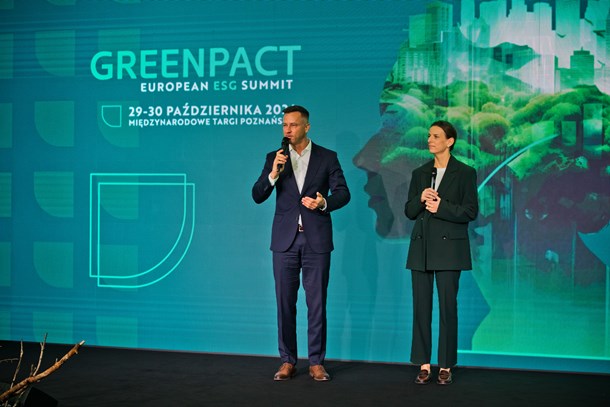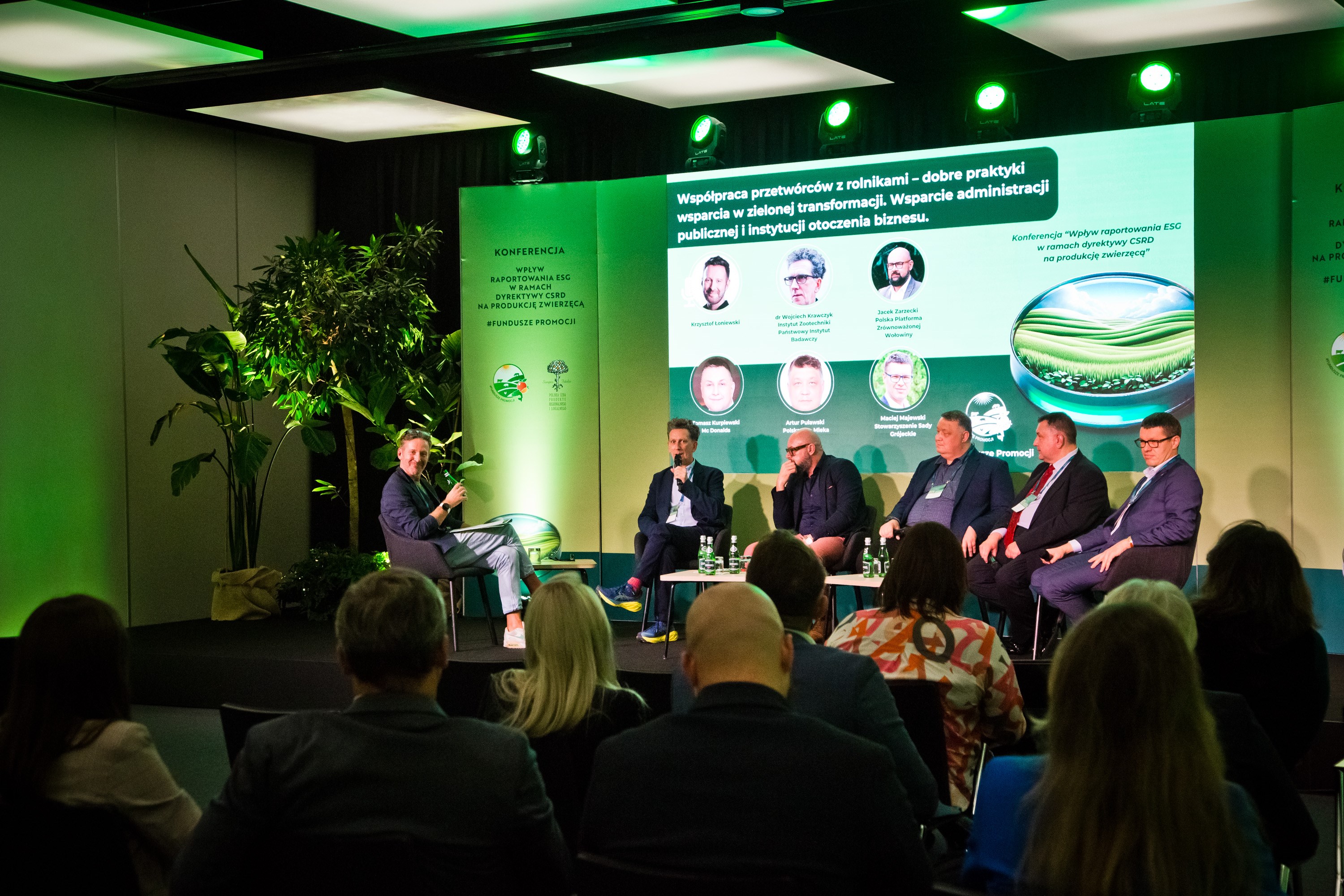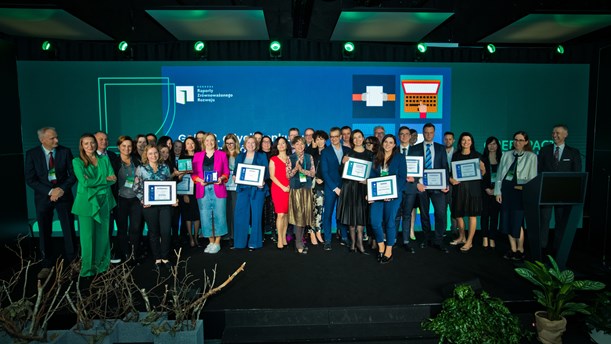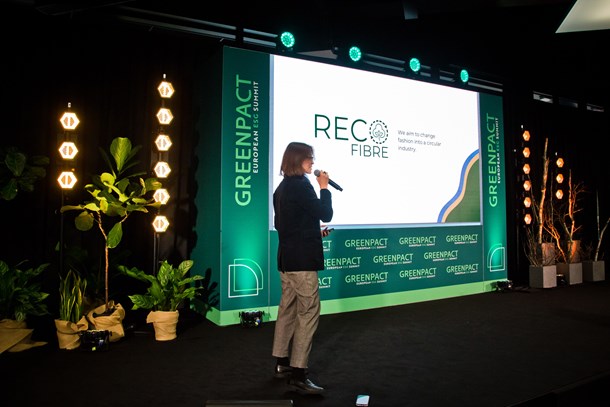Discussions on implementing specific solutions for sustainable development - the first edition of GREENPACT European ESG Summit behind us!
More than 1,300 people met at the end of October in Poznań to discuss ESG, sustainable development or green policies of the European Union among experts. All thanks to the first edition of the GREENPACT European ESG Summit, a result of cooperation between the MTP Group and the Polish Chamber of Commerce. One of the key conclusions from the event is that in the next few years sustainability reporting will become one of the most important factors in the selection of business partners, imposing on companies the need to transparently share information on the implementation of ESG activities.
Among over 1,300 participants of the first GREENPACT European ESG Summit were representatives of business, government, international agencies, as well as academics and activists. These were the people who, for two days, discussed how to combine issues related to caring for the environment and social environment with economic progress.
ESG - a key part of business
The congress is a response to the ESG reporting regulations covering the countries of the European Union, which will gradually cover more companies from 2025. As a result, over the next few years sustainability reporting will become one of the most important factors in the selection of contractors.
- We decided to organize the congress and to engage our existing partners and exhibitors in this important topic, and it should be remembered that we organize more than 80 events annually. We joined forces with the Polish Chamber of Commerce and created a good product” - said Filip Bittner, Vice President of the Management Board of the MTP Group.
GREENPACT, however, has not only a business purpose, but also an important educational task in the context of ESG. Both the MTP Group and the Polish Chamber of Commerce see the need to educate entrepreneurs about the implementation of sustainable development principles. Especially since the implementation of EU directives may pose a considerable challenge - not only organizational, but also financial. The Ministry of Finance estimates that the costs for companies subject to ESG reporting will amount to about PLN 8.7 billion over 10 years.
- We need to implement the EU law, but also educate on it, because it is very complicated. You can't read the reporting standards and be able to report. Large companies support themselves with consultants, but what about small, medium and micro-entrepreneurs? They're in the supply chain, so they're also required to disclose certain information, and that's a big challenge,” - said Karolina Opielewicz, Board Member of the Polish Chamber of Commerce.
It is worth mentioning that starting next year, large companies, including listed companies, banks and insurance companies, as well as entities with more than 500 employees, will be required to report ESG (for the 2024 fiscal year). In turn, from 2026, the requirements will be extended to companies with more than 250 employees, and from 2027 - also to small and medium-sized listed companies.

Is Polish food in danger of losing EU markets? New ESG challenges and preparing for the future in the context of legislative changes
An important part of the congress was a conference entitled “Impact of ESG reporting under the CSRD on livestock production” - organized by the Polish Chamber of Regional Product and financed by the Promotion Funds. The event discussed in detail the upcoming EU regulations, their potential impact on agricultural producers and food companies, and the challenges of calculating carbon footprint, which for many companies will be one of the first steps of adaptation. Discussions focused on new reporting obligations and opportunities to set ambitious sustainability goals.
Experts participating in the panel discussions held as part of the conference included lawyers, academic lecturers (Poznań University of Life Sciences, Wrocław University of Life Sciences), representatives of agricultural organizations (including the Polish Milk Chamber, the Polish Sustainable Beef Platform), as well as retail chains (Jeronimo Martins Polska S.A.). All unanimously stressed the importance of “green finance” as an investment in the future and the transformation of agriculture, which is important for the competitiveness of Polish food.
The conference discussed cooperation between processors and farmers and presented good practices to support the green transition, as well as the role of public administration and business environment institutions. Special attention was also given to packaging waste management and the upcoming Extended Producer Responsibility (ROP), Bail-in System and EU PPWR regulation, which will require companies to meet pro-environmental requirements. It was emphasized that thoughtful packaging can help reduce food waste, which translates into lower CO2 emissions.
As part of the panel titled “EU and national legislation on ESG - how to prepare for the future?”, Stefan Krajewski - Secretary of State at the Ministry of Agriculture and Rural Development stressed “Solutions must be created through dialogue, because the worst thing is when you impose a given thing, don't consult with the industry and we will have a repeat of last year, just as there were protests everywhere in terms of the European Green Deal.”
In turn, Tomasz Kurpiewski representing McDonald's, noted during a panel entitled “Cooperation of processors with farmers - good practices of support in the green transition and support of public administration and business environment institutions” - We set ourselves a cow, and it came out that this cow is emissivity in terms of both beef and cheese and milk. So it's very important to balance that emissivity and reduce it - if we want to actually do it to reduce net emissions, not per transaction, per kilogram or per kilometer of transportation. We need to engage with almost the entire industry - both from the growers' side, the farmers' side and the dairy farmers' side - that is, to approach this very holistically.
Jacek Zarzecki, representing the Polish Sustainable Beef Platform, addressed popular myths about the beef sector's impact on the environment, pointing to facts and data on greenhouse gas emissions: - I represent the beef sector - this is the sector that is said to be the main polluter of the planet and responsible for the largest percentage of greenhouse gas emissions. Only this is a myth. In Poland, agriculture is responsible for just over 7% of greenhouse gas emissions, about 4% is livestock production. In the European Union as a whole, all agriculture is 10%, 6% is animal production, primarily cattle production. He added that Poland will allocate significant financial resources to animal welfare in the coming years: - In Poland, we are allocating €1 billion 300 million, over the next five years, for animal welfare. Today we are a leader in animal welfare, which is an element of sustainable production in agriculture.
In the context of pro-environmental measures, attention was also given to the role of biogas plants and their potential contribution to reducing the carbon footprint of the food supply chain. Legal solutions that can support the development of the biogas sector were presented, as were calls for simplifying administrative procedures and increasing access to financing.

Top sustainability reports
The GREENPACT European ESG Summit also included the final gala of the 18th edition of the Sustainability Reports competition, organized by the Responsible Business Forum. A record number of 87 reports were submitted for this year's competition.
The award ceremony was preceded by speeches by guests and special guests. Among them were: Saskia Slomp - CEO of EFRAG, Kamil Jesionowski - President of the National Council of Statutory Auditors, and Dr. Piotr Wachowiak, Rector of the Warsaw School of Economics, chairman of the competition jury.
The main award in the sustainable development report category went to the LUG S.A. Capital Group; honorable mention: CCC S.A.; integrated report category - grand prize: Orange Polska; financial sector report category - main award: ING Bank Śląski S.A., honorable mentions: ERGO Hestia, PZU Group; debut category - main award: Respect Energy Holding S.A.; Internet users_ek award category: Allegro; non-business organization report category - honorable mentions: University of Warsaw, Dorastaj z Nami Foundation; Stock Exchange award - LUG S.A. Capital Group.
Full results of the 18th edition of the FOB competition.

Startup Stage i Top Impactor 2024
The first edition of the GREENPACT European ESG Summit was also an opportunity for startups to showcase their technological innovations that support sustainability, climate neutrality, biodiversity protection or the circular economy. During the themed Startup Stage, which served to connect innovators with big business and investors, the Top Impactor 2024 award was given. The title was awarded to Reco Fibre, a company that produces clothing from natural, recycled materials.
In addition to the Reco Fibre project, the award also went to the startup www.easysolar.app, which produces PV software that is powered by artificial intelligence. With Easy Solar, it is possible to automatically prepare a PV project and a quotation - both elements are generated with AI support.




